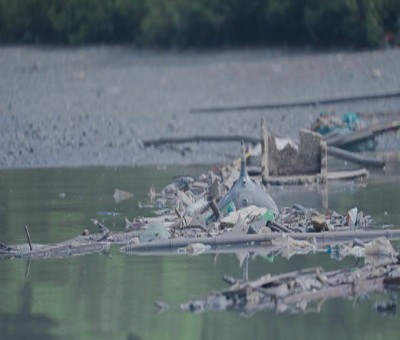
Mumbai, In a unique initiative, around 500 kg of solid waste was collected from the Versova-Malad Creek water using traditional fishing techniques in just 3 days, before the pollutants could flow into the Arabian Sea, officials said here on Saturday.
The waste-filter was installed in the Versova-Malad Creek in June as part of efforts to devise cost-effective yet long-term solutions to 'catch' the solid waste dumped in creeks, which are the source for rich marine ecology.
The innovation came over five years after a similar innovation was tested successfully in the dirty Oshiwara River and Mogra Nullah to trap large quantities of floating garbage in the fishing nets, tied to mangroves and suspended around two metres deep in the creek water to allow free movement of fish and other marine creatures.
The latest initiative named 'New Catch In Town', is pioneered by architects Jai and Ketaki Bhagdaonkar of the think tank Bombay61 Studio, Ministry of Magic Mumbai (MMM), research group Tapestry and the Koli fishing community.
The design based on the knowledge of the fisherfolk is community-led, using fishing nets to trap the solid waste that can be collected and recycled before it goes into the sea, said the innovators.
In just 72 hours, it trapped over 500 kg of solid waste in just one of the Creek outlets at Kavtya Khadi, mostly plastic which could be recycled to earn extra income for the fisherfolk, they said.
The simple solution has the potential to clear over 5 tonnes of garbage in a month, and in the Malad Creek an estimated nearly 25 tonnes solid waste can be collected each month with such net filters installed at its multiple outlets.
Fishermen rue how the amount of solid waste floating in the creeks and carried into the Arabian Sea has witnessed a massive increase in the past few decades even as Mumbai generates around 10,000-tonnes solid waste daily.
"We fix up nets in the creeks to catch fish and we felt the same technique could be deployed to trap the waste also. After discussing the technicalities, the installation was a success. We hope the government takes note of this and supports us in the interest of protecting our livelihood and keeping the water systems pollution-free," said a fisherman Vishnu Hegde, of Versova Koliwada.
Prof. Devanathan Parthasarthy of IIT-Bombay, and representing Tapestry, lauded the project and feels it can be an excellent initiative with substantial benefits by way of reduced plastic pollution in the sea waters and other water bodies in the city, while helping the fishing communities.
MMM's Harpreet Bhullar has urged the civic body and youth to support this innovation for wider applications and rejuvenate our shores while protecting the livelihood of the indigenous communities dependent on fishing.


.jpeg)

